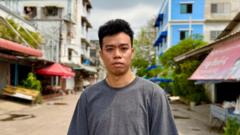The tremors from last Friday's earthquake in Sagaing, Myanmar, have reverberated through the hearts of its diaspora, especially in Thailand, home to approximately 4.3 million Myanmar nationals. The latter group includes workers from various sectors, many of whom have been deeply affected by the disaster, which resulted in at least 2,000 casualties and widespread destruction. For Ko Naing, a labor rights activist and supporter of the country’s resistance against the military junta, the loss is particularly personal; he has lost his great-uncle to the quake, a haunting loss that accentuates his feelings of guilt and helplessness.
Having fled Myanmar in July last year with his wife and young son due to the military’s crackdown on dissent, Ko Naing now finds himself in Thailand, where he feels a mixture of safety and despair. Many in the Myanmar diaspora report similar feelings of survivor’s guilt as they grapple with the inability to return home to assist with rescue efforts or check on their families, fearing political repercussions from the military.
"To be honest, I'm very depressed at the moment," said Ko Naing. He reflects on his struggles during the pandemic and the ongoing civil unrest following the military coup. "Then the earthquake has added to the suffering." The quake’s impact was felt far beyond its epicenter; communications were severely disrupted, preventing timely updates on loved ones until days following the catastrophe.
In bustling markets of Samut Sakhon, where many Myanmar workers reside, the quiet sorrow is palpable. Workers like Yin Yin and shopkeeper Thant Zin share their grief and helplessness, distressed by images of their homeland's destruction. "What a disaster! I feel so bad… We have never experienced this extent of damage before," mourned Thant Zin, as he reflects on the cultural and historical landmarks lost in the earthquake.
For Ko Naing, it is vital to channel despair into action. He is collaborating with others in the diaspora to raise funds and provide humanitarian aid to those affected by the earthquake. “If we always feel depressed, nobody will help our people… it's good that we're alive. We can still do something,” he emphasized while contemplating the future and the need for resilience.
As the community navigates this tumultuous period, it is united by a shared determination to support each other and their homeland, wrestling with their emotions while seeking to provide assistance to those who need it most.



















